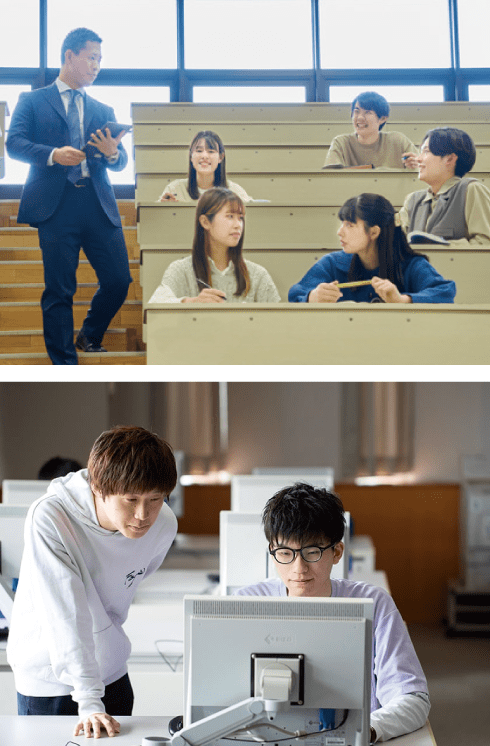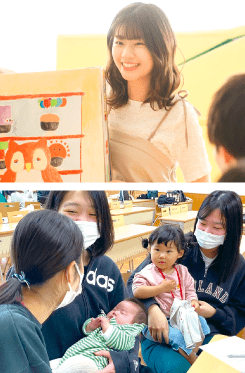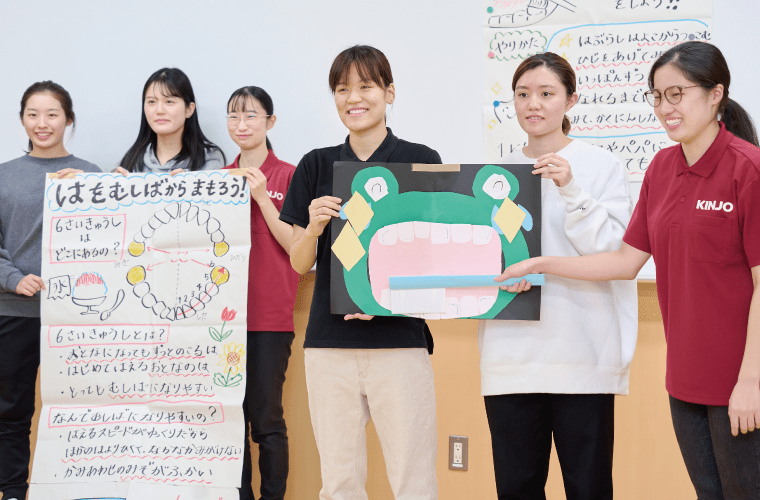Kinjo University
Faculty of Interdisciplinary Economics Department of Interdisciplinary Economics Overview

Grasping local communities from the perspectives of health, environment, region, tourism, culture, and industry, students of the Faculty of Interdisciplinary Economics contemplate on ways to revitalize local economies and communities from multifaceted perspectives in the social sciences, and gain knowledge and skills of information literacy and social research methods based on economics and business administration. As Problem-Based Learning (PBL) is incorporated into the curriculum in collaboration with local governments and businesses, the students get the chance to acquire practical skills by working on various problems occurring in the real world. In this way, we foster leaders capable of achieving sustainable community development that makes the residents happy. In this PBL program, students acquire knowledge and problem-solving skills that are directly related to the local community through internships and seminar-style classes taught by guest lecturers from businesses. Starting in their second year, students can choose from more than 100 internship opportunities available at local governments and businesses with which we have cooperative agreements. In addition to local governments, students can gain practical training at businesses of various industries including manufacturing, finance, merchandising, IT, health & medicine, and tourism.
Faculty of Human and Social Sciences Overview
The Faculty of Human and Social Sciences consists of two departments. The Department of Social Work offers a curriculum that reinforces the expertise of each course based on social welfare, while focusing primarily on careers in local medical and welfare facilities. The Department of Early Childhood Education and Care offers a curriculum that has been expanded to include the area of community welfare with the goal of nurturing competent individuals who not only have expertise on children but also are capable of holistically engaging in childhood education and care, including dealing with the social environment surrounding the children.
Department of Social Work Overview

The Department of Social Work offers two courses: the Social Work Course and the Life Support Course.
Through the Social Work Course, students gain knowledge on the spirit and government programs of social welfare, social welfare assistance skills, psychology, and the basics of medicine. The goal is to become a professional who coordinates social resources for people requiring support and consultation due to mental/physical disabilities or family background.
The Life Support Course enables students to develop high-level communication skills and gain expertise for becoming a leader in the field of geriatric care. The goal is to gain a broader range of knowledge and skills by engaging in geriatric care activities and preventive care that help people live longer in good health.
By completing either of these courses, students will be qualified for taking the national examination for becoming a Certified Social Worker. The courses also offer practical training at various facilities including support facilities for people with disabilities and welfare facilities for older adults. Students learn by experiencing the importance of communication skills, something that cannot be fully understood in a classroom.
Department of Early Childhood Education and Care Overview

Making the most of the privileged environment of having an affiliated kindergarten on campus, the students interact with children on a daily basis for four years. To enable students to obtain the national Daycare Worker Qualification and Kindergarten Teacher License and to respond to the changing conditions of daycare and early education facilities, the imagination and originality of students are nurtured by promoting learning through physical experience before studying theories, based on the Practice-Theory-Practice flow.
Moreover, the curriculum is designed to qualify students for taking the national examinations for the Daycare Worker Qualification, Kindergarten Teacher Type 1 License, and Certified Social Worker. Students gain expertise in the fields of childcare and early childhood education, as well as a broad range of knowledge concerning parents, guardians, and the local community. With the goal of supporting children as a member of society by communicating with their parents/guardians and collaborating with local governments, in addition to gaining practical training at relevant facilities, students develop skills for interacting with people through the planning and implementation of a project to create a space for children on campus.
Faculty of Health Sciences Overview
The Faculty of Health Sciences consists of the Department of Physical Therapy for becoming a physical therapist and the Department of Occupational Therapy for becoming an occupational therapist. Both departments nurture competent individuals who will support the future rehabilitation field. In an aging society that is increasingly health-conscious, physical and occupational therapy is gaining attention in a wide range of fields––including health maintenance and promotion for older adults as well as functional recovery––and the scope of activities of these treatments continues to expand.
Our goal is to nurture physical and occupational therapists who deal with each patient as a unique individual from the perspectives of treatment and welfare. Accordingly, in addition to providing a curriculum that focuses on specialties, we are implementing a community service project through research activities. Based on the opinions and thoughts of all generations collected through activities concerning children’s play and learning, high school sports clubs, and health promotion for older adults, we nurture healthcare professionals capable of flexibly responding to social conditions and each patient.
Department of Physical Therapy Overview

Our department nurtures professionals specializing in the field of physical therapy, i.e., physical therapists. Students of this department gain knowledge and skills for supporting patients with solid expertise in basic and clinical medicine. As our department has established partnership with more than 300 facilities, students can gain extensive practical training at a facility of any healthcare area requiring physical therapists.
Designed to accommodate the needs of healthcare worksites, our curriculum also includes classes of the welfare field offered by the Faculty of Human and Social Sciences, such as Introduction to Social Welfare and Welfare for Older Adults. Furthermore, we are now offering classes focusing on health maintenance and promotion, such as Health Science and Sports Rehabilitation. We nurture physical therapists who deal with each patient as a unique individual by responding to the needs of an aging society that is increasingly health-conscious. By developing medical, welfare, and other relevant perspectives, students will become well-prepared to make valuable contributions to multidisciplinary team-based care in their future worksites.
Department of Occupational Therapy Overview

Our department nurtures professionals specializing in the field of occupational therapy, i.e., occupational therapists. In order to gain knowledge and skills for meeting the increasingly diverse and sophisticated needs of occupational therapy, students mainly take basic courses in medical and other fields in their first year. In their second and third year, students learn the basics of occupational therapy, leading to their clinical training and senior project in the fourth year. In addition to gaining the required knowledge and skills, students develop the qualities essential for taking on leadership roles at rehabilitation worksites.
Emphasizing on education through training so that students develop the practical skills needed as a professional, our curriculum includes 1,000 hours of practical training, meeting the education standards of the World Federation of Occupational Therapists. With the cooperation of local governments, nearby schools, and educational institutions, students gain the required knowledge and skills through practical training for improving the physical, mental, social, occupational, recreational, and educational aspects of the life of patients with injuries or disabilities, enabling the patients to lead an independent (or self-directed) life. One example is community support training: along with faculty members, students visit local patients and develop their abilities through hands-on physical therapy.
Faculty of Nursing Department of Nursing Overview

Enhancing practical skills through extensive simulation learning and taking classes on skills concerning information technology, students develop nursing skills with attentive educational support. Furthermore, on the basis of small-group learning, students develop their abilities mainly through problem-based learning. In this approach, they work in groups and come up with solutions for various problems by collecting relevant information on their own. Our university is unique in that students of our faculty learn together with students of the Faculty of Health Sciences aiming to become physical/occupational therapists as well as students of the Faculty of Human and Social Sciences studying to become a social worker or a geriatric care worker. Utilizing this unique advantage, we nurture experts with strong communication skills and broad knowledge in the fields of medicine and welfare. This advantage enables them to be competent at medical/welfare worksites, where multidisciplinary team-based care is increasingly adopted.
Collaborating closely with Public Central Hospital of Matto Ishikawa located in Hakusan City, Ishikawa, we also provide extensive learning opportunities. Furthermore, in response to the ongoing nationwide establishment of government-lead community-based integrated care systems, which aim to provide medical and geriatric care within the community, we nurture nurses capable of leading community-based integrated care.
Advanced Course
Advanced Course of Public Health Nursing Overview

This course has two goals: to nurture competent individuals capable of providing effective health services in the community while responding to the community’s new healthcare problems as well as the increasingly diverse and sophisticated needs of community residents, and to nurture competent individuals capable of appropriately solving the health problems of the community through multidisciplinary collaboration involving various fields such as health, medicine, welfare, and geriatric care.
Building on what they learned in the Faculty of Nursing, students spend another year to gain specialized knowledge and skills by studying public health nursing in depth, expanding their opportunities as a nurse. By continuously engaging in public health nursing activities, students gain practical abilities as well as the knowledge, skills, and mindset needed as a public health nurse.




